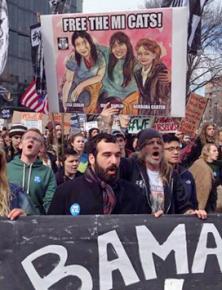Going to jail for protesting pipeline polluters?
reports on the courage and commitment of Michigan activists who are fighting for climate justice and against the poisoning of their community.
THREE ACTIVISTS arrested in the summer of 2013 for protesting construction on a pipeline to transport tar sands oil face sentencing on March 5.
The protesters--60-year-old Vicci Hamlin, 22-year-old Barb Carter and Lisa Leggio, a single mother of two--were convicted of trespassing, and resisting and obstructing a police officer on January 31 and ordered to remain in custody until sentencing on March 5, even though none is considered a flight risk. Each of the three face up to three years in prison.
The Enbridge 3, as the three have come to be known, chained themselves to construction equipment last summer to stop expansion of the Enbridge Line 6B Pipeline as part of a wider series of protests planned by the Michigan Coalition Against Tar Sands (MICATS) and its sister group, the Detroit Coalition Against Tar Sands (DCATS). Their goal was to delay expansion of the pipeline, but also to educate the public about the ecological damage caused by the exploitation of tar sands oil deposits.
After the Enbridge 3 were found guilty, leading climate scientists Dr. James Hansen and Dr. Michael Mann as well as environmentalist and 350.org founder Bill McKibben co-authored an open letter asking the judge to show leniency in sentencing the three activists.

After pointing out the dire state of the environment and the lack of success in addressing climate change through legislation, Hansen, Mann and McKibben described our moment as "the classic situation where the need to engage in political protest and civil disobedience finds firm support in American history."
They concluded their letter with these words:
We hope you will exercise discretion and mercy in sentencing these women. We are reminded, for instance, that Dr. Martin Luther King never spent more than 30 consecutive days in jail throughout his career of civil disobedience, a career that at the time was the object of much scorn and fury, but which in retrospect is a source of pride to all Americans.
IN ADDITION to concerns about what the pipeline might mean for the future, the three activists were also motivated by the past. The very pipeline they were protesting burst in 2010, spilling more than 1 million gallons of tar sands oil as well as the toxic chemicals necessary to make this kind of oil flow through a pipeline. The oil gushed through a six-foot tear in the pipeline for hours before the pipeline operators were able to shut it down.
Much of the oil ended up in the Kalamazoo River and the community surrounding it, essentially poisoning a whole town. After spending two years and roughly $750 million to clean up the river, most of the 35 miles closed for recreational use was reopened. Even though the Enbridge spill was one of the largest and most costly inland oil spills in American history, another spill that same year--the BP oil spill in the Gulf of Mexico--overshadowed media coverage of the Kalamazoo disaster.
Tar sands oil--toxic oil sludge extracted in Alberta, Canada--is considered the world's dirtiest fuel. When burned, this oil produces at least three times the amount of greenhouse gas emissions as conventional crude oil.
What's more, the spills and other toxic byproducts and pollution from pipelines such as the Enbridge Line are all too common and tend to affect low-income communities at higher rates. Petroleum coke, for example, which is a cheap and dirty fuel primarily sold abroad, is regularly stored in the open where wind can sweep the toxic dust into the air and into the homes and lungs of poor communities often on the outskirts of urban industrial zones.
The Enbridge 3, however, were not allowed to argue as part of their defense that their actions were "environmentally necessary." But as James Hansen put it in a New York Times op-ed article, the full exploitation of dirty fuels such as tar sands would be "game over" for the climate, making the actions of the activists as about as "environmentally necessary" as can be.
The criminal prosecution the Enbridge 3 for their act of civil disobedience brings back memories of the saga of Tim DeChristopher.
DeChristopher was a Utah-based graduate student who disrupted the illegal auction of land parcels for use of drilling back in 2008 by casting a winning bid without the intent of actually purchasing the lot. As a result, he was sentenced to two years in prison. Although he did not use the exact phrase, the judge in that case also told the jury to not consider whether or not DeChristopher's actions were environmentally necessary, thus giving the prosecution a huge advantage.
Since being released from prison, DeChristopher has continued his activism and has expressed his support for the Enbridge 3, including when he recently attended the launch of the Global Climate Convergence in Chicago.
In the wake of their conviction, the Enbridge 3 and other MICATS members are calling for a federal investigation of Enbridge and the Environmental Protection Agency for colluding in a cover-up of the use of toxic chemical dispersants as part of the cleanup of the Kalamazoo River.


